

RORA Gene - GeneCards. Gene in genomic location according to Ensembl data Experimental tissue vectors: Duplicate measurements were obtained for twelve normal human tissues hybridized against Affymetrix GeneChips HG-U95A-E.

The intensity values (shown on the y-axis) were normalized and drawn on a novel scale, which is an intermediate between log and linear scales. This enables displaying several orders of magnitude on the same graph, while emphasizing the differences between them. Noise was not subtracted out, so values below 10 may be suspect. Further, each probeset's expression profile was converted into binary form when possible. Multiple probe-sets corresponding to this gene are included for its tissue vector calculation only if their normalized intensity levels reach a threshold in at least one tissue.
Changing brains: why neuroscience is ending the Prozac era. Mice are used in research into optogenetics, which suggests that even finer control of the brain may be possible.
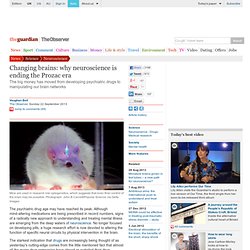
Photograph: John B Carnett/Popular Science via Getty Images The psychiatric drug age may have reached its peak. Although mind-altering medications are being prescribed in record numbers, signs of a radically new approach to understanding and treating mental illness are emerging from the deep waters of neuroscience. No longer focused on developing pills, a huge research effort is now devoted to altering the function of specific neural circuits by physical intervention in the brain. Anti-depressant link to Clostridium difficile infection. Patients who use anti-depressants can be more likely to suffer relapse, researcher finds. Patients who use anti-depressants are much more likely to suffer relapses of major depression than those who use no medication at all, concludes a McMaster researcher.
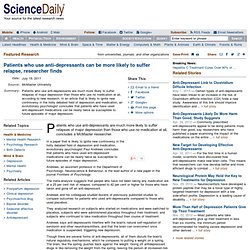
In a paper that is likely to ignite new controversy in the hotly debated field of depression and medication, evolutionary psychologist Paul Andrews concludes that patients who have used anti-depressant medications can be nearly twice as susceptible to future episodes of major depression. Andrews, an assistant professor in the Department of Psychology, Neuroscience & Behaviour, is the lead author of a new paper in the journal Frontiers of Psychology. The meta-analysis suggests that people who have not been taking any medication are at a 25 per cent risk of relapse, compared to 42 per cent or higher for those who have taken and gone off an anti-depressant. Andrews and his colleagues studied dozens of previously published studies to compare outcomes for patients who used anti-depressants compared to those who used placebos.
Anti-depressants likely do more harm than good, study suggests. Commonly prescribed anti-depressants appear to be doing patients more harm than good, say researchers who have published a paper examining the impact of the medications on the entire body.

"We need to be much more cautious about the widespread use of these drugs," says Paul Andrews, an evolutionary biologist at McMaster University and lead author of the article, published recently in the online journal Frontiers in Psychology. "It's important because millions of people are prescribed anti-depressants each year, and the conventional wisdom about these drugs is that they're safe and effective.
" Psychiatry: An Industry Of Death 1/10. Psychedelic Trips Don't Harm Mental Health. After emerging from drug-induced hallucinations, people often describe their experiences as mystical and introspectively illuminating.
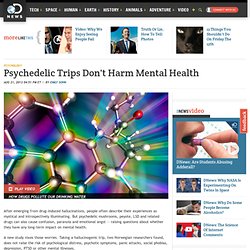
But psychedelic mushrooms, peyote, LSD and related drugs can also cause confusion, paranoia and emotional angst — raising questions about whether they have any long-term impact on mental health. Media releases. Beyondblue Chairman The Hon.
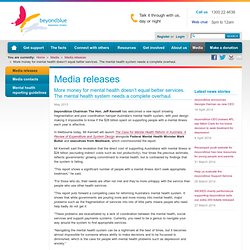
Jeff Kennett has welcomed a new report showing fragmentation and poor coordination hamper Australia’s mental health system, with poor design making it impossible to know if the $28 billion spent on supporting people with a mental illness each year is effective. In Melbourne today, Mr Kennett will launch The Case for Mental Health Reform in Australia: A Review of Expenditure and System Design alongside Federal Mental Health Minister Mark Butler and executives from Medibank, which commissioned the report. Mr Kennett said the revelation that the direct cost of supporting Australians with mental illness is $28 billion (excluding indirect costs such as lost productivity), four times the previous estimate, reflects governments’ growing commitment to mental health, but is contrasted by findings that the system is failing.
Psychiatry: An Industry Of Death 1/10. Paranoia. Dr. Peter Breggin: The Diagnosing and Drugging of 'ADHD' Children. The diagnosing of millions of children with ADHD in order to medicate them with stimulants and other psychoactive chemicals is an American tragedy, growing into a worldwide catastrophe.
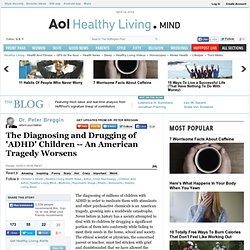
Never before in history has a society attempted to deal with its children by drugging a significant portion of them into conformity while failing to meet their needs in the home, school and society. The ethical scientist or physician, the concerned parent or teacher, must feel stricken with grief and dumbfounded that we have allowed the interests of powerful advocacy groups to completely override the interests of our children. To make matters worse, on Oct. 16, 2011 the American Academy of Pediatrics overrode the FDA and recommended that children as young as age four be diagnosed with ADHD and given the stimulant methylphenidate (e.g., Ritalin, Metadate, Focalin, Daytrana and Concerta). Dr. Peter Breggin: Drug Companies Drive the Psychiatric Drugging of Children. With Ginger Breggin Johnson & Johnson, the company that makes the antipsychotic drug Risperdal, has tentatively agreed to a settlement of $2.2 billion to resolve a federal investigation into the company's marketing practices.
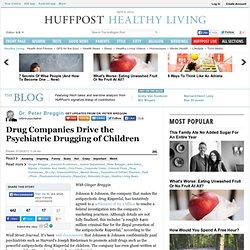
Mental disorders affect 1 in 5 US children each year - health - 20 May 2013. As many as one in five children aged 3 to 17 years old experiences a mental health disorder each year, according to a new report from the US Centers for Disease Control and Prevention (CDC).
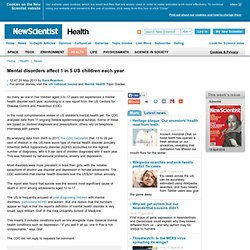
In the most comprehensive review of US children's mental health yet, the CDC analysed data from 11 ongoing federal epidemiological surveys. Some of these are based on doctors' diagnoses and prescriptions; others rely on telephone interviews with parents. By analysing data from 2005 to 2011, the CDC calculated that 13 to 20 per cent of children in the US have some type of mental health disorder annually. Attention deficit hyperactivity disorder (ADHD) accounted for the highest number of diagnoses, with 6.8 per cent of children diagnosed with it each year.
This was followed by behavioural problems, anxiety and depression. Most disorders were more prevalent in boys than girls, with the notable exceptions of alcohol use disorder and depression in female adolescents. More From New Scientist Recommended by. A matter of perspective. Fish show autism-like gene expression in water with psychoactive pharmaceuticals. Psychoactive medications in water affect the gene expression profiles of fathead minnows in a way that mimics the gene expression patterns associated with autism spectrum disorder in genetically susceptible humans, according to research published June 6 in the open access journal PLoS ONE.
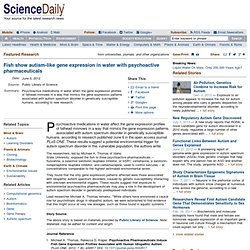
These results suggest a potential environmental trigger for autism spectrum disorder in this vulnerable population, the authors write. The researchers, led by Michael A. Thomas of Idaho State University, exposed the fish to three psychoactive pharmaceuticals -- fluoxetine, a selective serotonin reuptake inhibitor, or SSR1; venlafaxine, a serotonin-norepinephrine reuptake inhibitor, and carbamazepine, used to control seizures -- at concentrations comparable to the highest estimated environmental levels.
Lead researcher Michael A. There Is No Such Thing as Mental Illness. Why the White Brain Matters. If you set out to understand a building’s lighting system but examined only the fixtures, switches, and outlets, never the wiring in the walls and basement, you might be pretty puzzled. Something like that has happened in the study of the brain, suggests behavioral neurologist Christopher Filley. Scientists now beginning to probe the long-neglected half of the brain called the white matter are discovering how it specializes in connectivity, with bundles of insulated “wiring” that link neurons within and between gray matter areas into ensembles that may produce the light of conscious mental functioning.
A pioneer of research on white matter, Filley proposes a new field of study that would bring “the other half of the brain” into the mainstream of neuroscience. Given the crossword puzzle clue “brain stuff,” what would come to your mind? Quite a few readers might answer “gray matter” and with reason. Psychological side-effects of anti-depressants worse than thought. A University of Liverpool researcher has shown that thoughts of suicide, sexual difficulties and emotional numbness as a result of anti-depressants may be more widespread than previously thought. In a survey of 1,829 people who had been prescribed anti-depressants, the researchers found large numbers of people -- over half in some cases -- reporting on psychological problems due to their medication, which has led to growing concerns about the scale of the problem of over-prescription of these drugs.
Psychologist and lead researcher, Professor John Read from the University's Institute of Psychology, Health and Society, said: "The medicalization of sadness and distress has reached bizarre levels. Shocking Truth: How Institutional Education & Psychotropic Drugs Have Created Generation Lost. Psychiatry: An Industry Of Death 1/10. CCHR Int Psychiatric Drug Database. 3/5.Prozac, Zoloft, Paxil, Viagra, Lipitor, Cialis, Nexium. Exposure to anti-depressants in pregnancy may increase autism risk, study suggests. Antidepressant Use During Pregnancy Associated With Some Adverse Outcomes In Newborns.
Exposure to a certain class of antidepressant medications during pregnancy may be associated with an increased risk of preterm birth, a low five-minute Apgar score (a measure of overall health of the baby) and admission to the neonatal intensive care unit, according to a report in the October issue of Archives of Pediatrics & Adolescent Medicine, one of the JAMA/Archives journals. More than one in ten pregnant women are estimated to have depression, comparable in frequency and severity to postpartum depression, according to background information in the article. "Depression, antidepressants and lifestyle factors associated with depression may influence pregnancy outcomes and newborn health," the authors write.
Antidepressants in pregnancy increase risk of miscarriage, study finds. A new study in CMAJ (Canadian Medical Association Journal) found a 68% increase in the overall risk of miscarriage in pregnant women using antidepressants. Risk of transient breathing difficulties in newborns of mothers on antidepressants.
Infants of expectant mothers who take antidepressant drugs, known as selective serotonin reuptake inhibitors (SSRIs), during late pregnancy are at an increased risk for persistent pulmonary hypertension (high blood pressure in the lungs) finds a study published. The authors stress that the risk is still low even in the context of SSRI exposure, but say pregnant women considering or using SSRIs and their families should be counseled about the condition and that it can typically be managed successfully if it does occur following SSRI exposure.
Decisions about treatment for depression during pregnancy must consider potential risks to both the mother and the unborn baby.